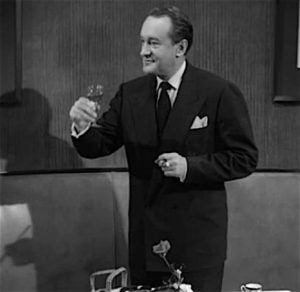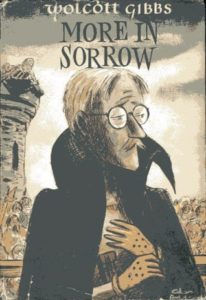 “What is patriotism but love of the good things we ate in our childhood?”
“What is patriotism but love of the good things we ate in our childhood?”
Lin Yutang, The Importance of Living
Terry Teachout on the arts in New York City
My Wall Street Journal review of the Broadway revival of Hello, Dolly! stirred up a good-sized dust storm of controversy, as pans are wont to do. I received a fair number of e-mails assuring me that I was a beast in human form—one correspondent actually went so far as to compare me to Hitler—and at least as many expressing relief that I’d told the truth about the failings of the production and its star, Bette Midler, who is much loved by the theatergoers of New York.
One of the milder of the former letters has stuck in my mind:
So disappointed in your review of Dolly. I have not seen it yet but intend to. Theatre is meant to be enjoyed. From whatever angle and if people stop seeing theatre because of reviews like yours of Ms. Midler then we have problems in the industry. Support theatre and note your dislikes but don’t broadcast and sow seeds of negativity. Doesn’t help our industry at all. Sorry you didn’t enjoy.
 I’m sorry, too, since I always go to the theater in the hope of enjoying myself. That said, I confess to finding this letter close to incomprehensible, though perhaps “incoherent” is a better word. To the extent that it means anything, the author appears to be echoing Thumper’s father in Bambi, who famously told his child, “If you can’t say something nice, don’t say nothing at all.” That, I assume, is what my correspondent means when he tells me to “support theatre and note your dislikes but don’t broadcast and sow seeds of negativity.” In fact, it’s fairly well known in the business that I tend to err on the side of generosity, especially as regards performers. I believe devoutly in my own critical commandment: Always treat artists with respect. Most of them know how to do something you can’t do.
I’m sorry, too, since I always go to the theater in the hope of enjoying myself. That said, I confess to finding this letter close to incomprehensible, though perhaps “incoherent” is a better word. To the extent that it means anything, the author appears to be echoing Thumper’s father in Bambi, who famously told his child, “If you can’t say something nice, don’t say nothing at all.” That, I assume, is what my correspondent means when he tells me to “support theatre and note your dislikes but don’t broadcast and sow seeds of negativity.” In fact, it’s fairly well known in the business that I tend to err on the side of generosity, especially as regards performers. I believe devoutly in my own critical commandment: Always treat artists with respect. Most of them know how to do something you can’t do.
Bette Midler knows how to do plenty of things I can’t do. Alas, she didn’t do any of them very well on the night that I saw and heard her, and since the producers of Hello, Dolly! were and are charging a huge amount of money to see the show, I felt it was my duty as a critic to say so as clearly as possible.
Was I sowing seeds of negativity? Of course, at least as regards Midler and the rest of the production, which I disliked intensely. And the fact that a great many other people wrote to the Journal to express relief that at least one critic had seen and heard what they saw and heard on the stage of the Shubert Theatre suggests that negativity was precisely what I should have been sowing. But as best as I can tell, the author of this letter thinks I should instead have written something like this: No, Bette Midler wasn’t as good as she could have been, and I didn’t much care for the production, either, but none of that really matters. Theater is great! Come see a Broadway show—if not this one, then another!
Needless to say—or so I wish—a drama critic who stoops to this kind of Pollyannish boosterism isn’t merely failing to do his job, he’s doing the opposite of his job. It’s as if a restaurant critic who visited a bistro whose chef burned the entrées were to write, Sure, my steak was overdone three nights in a row, but I love steak, so go out to eat more often—you’ll be glad you did!
As for the suggestion that my review of Hello, Dolly! will cause anyone to “stop seeing theatre,” allow me to cite Daffy Duck:
If my review stopped anybody from spending several hundred dollars to hear Bette Midler sing really, really badly, then I rejoice. If, on the other hand, it caused even one of my readers to stop seeing theater, I think it’s safe to say that the reader in question didn’t much care for theater in the first place.
 I hasten to add, by the way, that I despise gratuitously nasty criticism. It was, for instance, unforgivable of John Simon to describe Liza Minnelli in this way after seeing her in the film version of Cabaret:
I hasten to add, by the way, that I despise gratuitously nasty criticism. It was, for instance, unforgivable of John Simon to describe Liza Minnelli in this way after seeing her in the film version of Cabaret:
Plain, ludicrously rather than pathetically plain, is what Miss Minnelli is. That turnipy nose overhanging a forward-gaping mouth and hastily retreating chin, that bulbous cranium with eyes as big (and as inexpressive) as saucers; those are the appurtenances of a clown—a funny clown, not even a sad one. And given a matching figure—desperately uplifted breasts, waist indistinguishable from hips—you just cannot play Sally Bowles. Especially if vou have no talent. In fact, Miss Minnelli has only two things going for her: a father and a mother who got her there in the first place, and tasteless reviewers and audiences who keep her there.
I speak as one who has long admired much of Simon’s criticism—but not that kind of thing, not even slightly. I can say with unshakable certitude that I have never in my life written anything remotely like that appalling paragraph, which was neither true nor funny, merely…well, negative.
By way of contrast, this is what I wrote about Bette Midler in my Hello, Dolly! review:
Ms. Midler’s singing voice is in a desperate, sometimes shocking state of disrepair. If you remember what Ethel Merman sounded like in her last years, you’ll know exactly how she sounded in “Before the Parade Passes By.” I’m not sure whether she’s suffering from an acute case of laryngitis (her speaking voice was hoarse as well) or the inescapable effects of age (she is 71). Whatever the reason, her singing suggested that she’d have trouble making it through the curtain calls, much less the run of a show as demanding as “Dolly!” As for the rest of the performance, Ms. Midler doesn’t even bother to act: She simply comes on stage and plays her familiar self, albeit at a disturbingly low level of energy. Unlike Carol Channing, who created the role, she can’t dance and isn’t funny (I was actually embarrassed by her mugging in the courtroom scene). All she has to offer is the memory of a great career, and if that’s enough for you, then you’ll be happy to shell out to see her in “Hello, Dolly!”
 It is, I hope, clear that I bore no malice of any kind toward her. I deeply regretted having to write this paragraph, as I always do when I feel obliged to write such things. I’m with Wolcott Gibbs, the notoriously waspish theater critic of The New Yorker, who gave the title More in Sorrow to a collection of his reviews. I don’t know whether Gibbs meant it in his heart of hearts, but I really, truly do: I’m on the side of theater, and I hate writing pans. I get no pleasure whatsoever out of it. When I do so, it’s because my job, as I understand it, is to report accurately on what I see and hear—to steer the reader as straight as I possibly can. Sometimes that means I have to say sharply negative things, but I prefer to say strongly positive ones. Any critic who feels otherwise is in the wrong line of work.
It is, I hope, clear that I bore no malice of any kind toward her. I deeply regretted having to write this paragraph, as I always do when I feel obliged to write such things. I’m with Wolcott Gibbs, the notoriously waspish theater critic of The New Yorker, who gave the title More in Sorrow to a collection of his reviews. I don’t know whether Gibbs meant it in his heart of hearts, but I really, truly do: I’m on the side of theater, and I hate writing pans. I get no pleasure whatsoever out of it. When I do so, it’s because my job, as I understand it, is to report accurately on what I see and hear—to steer the reader as straight as I possibly can. Sometimes that means I have to say sharply negative things, but I prefer to say strongly positive ones. Any critic who feels otherwise is in the wrong line of work.
* * *
An excerpt from Walt Disney’s 1942 film version of Felix Salten’s Bambi, directed by David Hand:
Anton Ego’s climactic speech from Ratatouille, written and directed by Brad Bird and performed by Peter O’Toole:
 Suzanne Farrell and Richard Rapp dance the roles of Titania and Bottom in a pas de deux in a 1966 film version of the complete ballet, directed by Dan Eriksen. The score, conducted by Robert Irving, is by Felix Mendelssohn:
Suzanne Farrell and Richard Rapp dance the roles of Titania and Bottom in a pas de deux in a 1966 film version of the complete ballet, directed by Dan Eriksen. The score, conducted by Robert Irving, is by Felix Mendelssohn:
(This is the latest in a series of arts-related videos that appear in this space each Monday, Wednesday, and Friday)
An ArtsJournal Blog